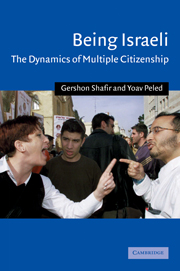Book contents
- Frontmatter
- Contents
- Acknowledgements
- List of abbreviations
- 1 Introduction
- Part 1 Fragmented citizenship in a colonial frontier society
- Part 2 The frontier reopens
- Part 3 The emergence of civil society
- 8 Agents of political change
- 9 Economic liberalization and peacemaking
- 10 The “constitutional revolution”
- 11 Shrinking social rights
- 12 Emergent citizenship groups? Immigrants from the FSU and Ethiopia and overseas labor migrants
- 13 Conclusion
- Bibliography
- Index
- Cambridge Middle East Studies 16
9 - Economic liberalization and peacemaking
Published online by Cambridge University Press: 05 June 2012
- Frontmatter
- Contents
- Acknowledgements
- List of abbreviations
- 1 Introduction
- Part 1 Fragmented citizenship in a colonial frontier society
- Part 2 The frontier reopens
- Part 3 The emergence of civil society
- 8 Agents of political change
- 9 Economic liberalization and peacemaking
- 10 The “constitutional revolution”
- 11 Shrinking social rights
- 12 Emergent citizenship groups? Immigrants from the FSU and Ethiopia and overseas labor migrants
- 13 Conclusion
- Bibliography
- Index
- Cambridge Middle East Studies 16
Summary
In this chapter we examine in detail the nature of the crisis that beset Israeli society and its economy between the mid-1970s and the early 1990s, and of the institutional transformation that was consequent upon it, as well as their interaction with, and impact upon, Israeli citizenship. The institutions we chose to examine are the military, the Histadrut, and what we would broadly call the institutions of the capital market and the business community. We will inquire how the decline of the republican institutions, foremost among them the Histadrut, reshaped the relationship between the state and the market. Of the various aspects of the deregulation and liberalization of the economy we will focus on one: the gradual but by now decisive liberalization of the capital market. In our view it is this aspect of liberalization that created, by the early 1990s, the conditions for the emergence, for the first time, of an Israeli business community – a more-or-less cohesive social sector made up of professional business executives interested primarily in profit making (and their counterparts in the state administration) and not beholden to the state, the Histadrut, or the values of pioneering republican virtue. Indeed, the very term “business community” is new in Israel, and we date its origins to the past decade. We will trace the emergence of this community by focusing on the shifting fortunes of the largest Israeli corporation: Koor Industries, once the flagship of the Histadrut's Chevrat Haovdim, now Israel's largest multinational holding company.
- Type
- Chapter
- Information
- Being IsraeliThe Dynamics of Multiple Citizenship, pp. 231 - 259Publisher: Cambridge University PressPrint publication year: 2002



